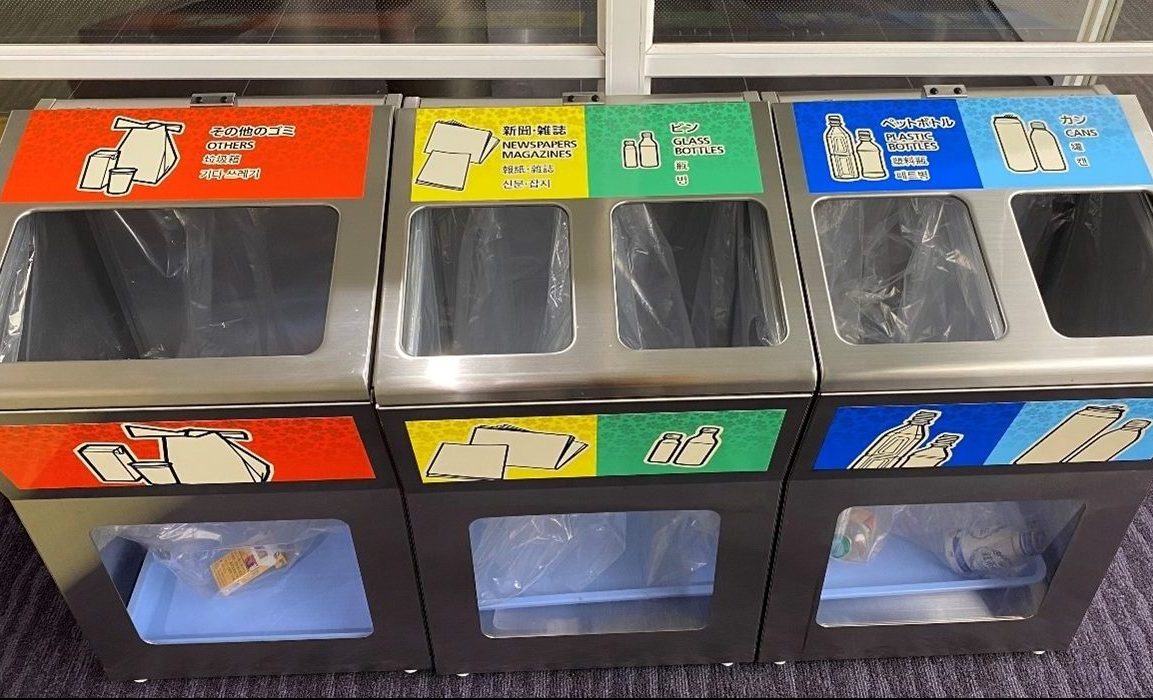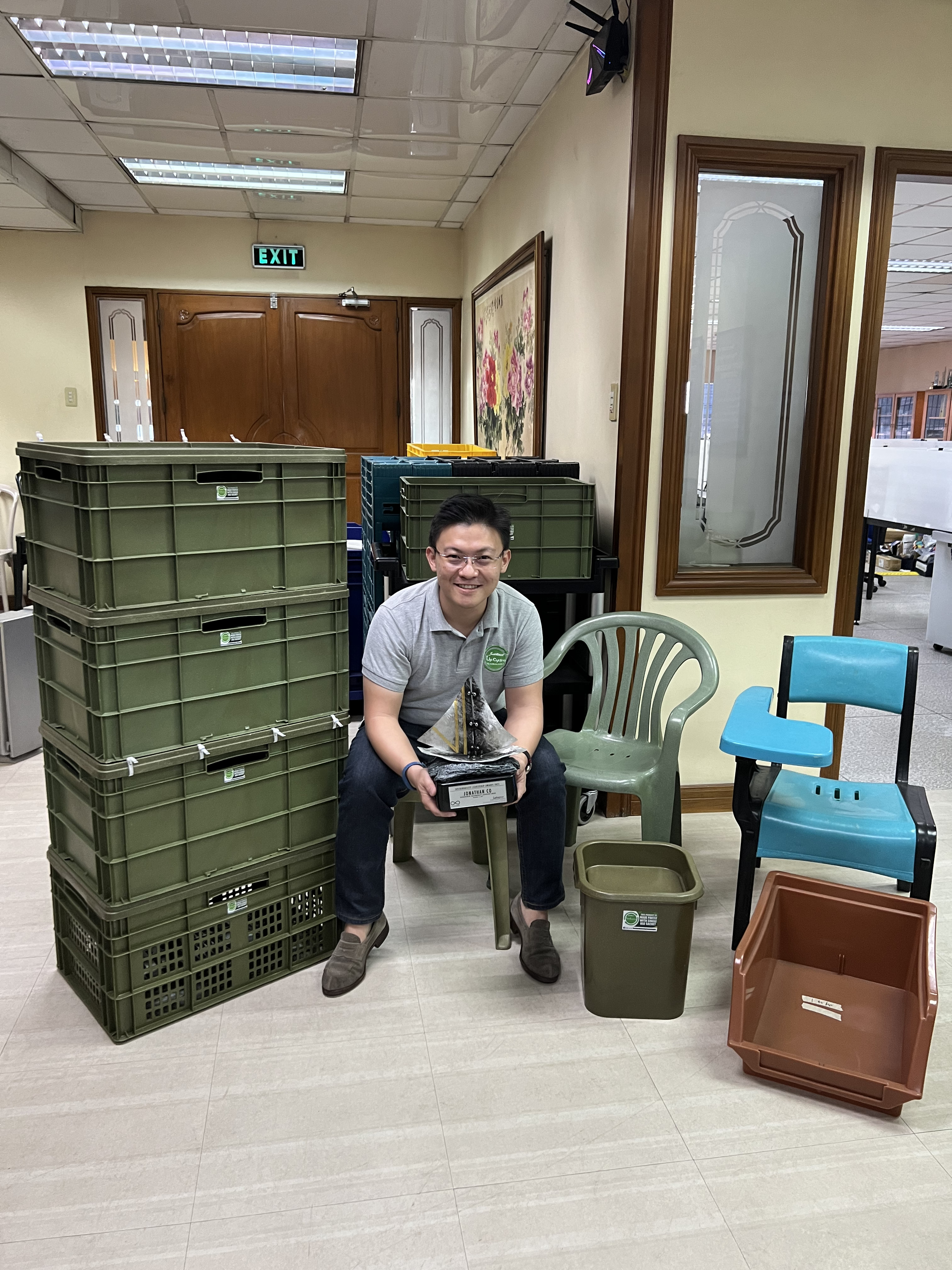

Kyoto, 13-18 March 2023: A team from ERIA's Regional Knowledge Centre for Marine Plastic Debris (the Centre) gained a great deal from the 3R International Scientific Conference on Material Cycles and Waste Management (3RINCs) in Kyoto, Japan. As well as being a great opportunity for knowledge sharing, it was also the perfect occasion to observe the city's waste management good practices.
Waste Segregation from the Source
Waste segregation is widely practiced in Japan. The trash bins in public spaces come in a selection of colours to differentiate the type of waste. For instance, in Tokyo Narita Airport the light blue bins are for cans, dark blue for plastic bottles, green for glass bottles, yellow for newspapers/magazines, and red for others.
also separate their waste in housing areas by using different coloured waste collection bags. These bags are then placed outside their houses to be picked up by the relevant authorities.
‘Different cities might have different regulations as to which colour should be assigned for which bags of waste, or the pick-up day of certain types of the waste. Furthermore, some cities distribute the coloured bags for free, but some others require their citizens to buy the bags in the supermarket,’ said Mr Michikazu Kojima, ERIA Senior Advisor.
Despite the common practice of waste segregation in Japan, trash bins are barely found in public places, yet the country remains litter-free. This contradicts the disposal behaviour theory which states people tend to litter if there is no trash bin nearby.
‘It all started back in 1964 during [the] Tokyo Olympics when the Tokyo Metropolitan Government removed public trash bins to keep the city clean. People were made responsible for their own waste and brought theirs home,’ said Mr Kojima.
These habits continue today, making this unique Japanese approach a good example for other countries to adopt.
Gaining More from Sustainable Action
Several hotels in Japan encourage their guests to take action to promote sustainability. In Oakwood Hotel Oike Kyoto, for instance, customers receive vouchers worth JPY 500 (about US$3.6) per day if they opt out of the daily room cleaning service. The vouchers can be redeemed in convenience stores around the country.
Participating guests sign a consent form in the morning instructing the hotel not to clean their rooms nor change the towels and toiletries. This not only reduces carbon emissions and plastic waste, but also promotes environmental protection.
Bulk Stores to Reduce Plastic Use
Buying products in bulk to reduce plastic use is a common practice in Japan. In Kyoto, zero-waste organic store Totoya sells daily commodities such as rice, spices, herbs, and vegetables in bulk. Customers are required to bring their own bags and containers, or use the free paper bags provided by the store.
Kyoto, 13-18 March 2023: A team from ERIA's Regional Knowledge Centre for Marine Plastic Debris (the Centre) gained a great deal from the 3R International Scientific Conference on Material Cycles and Waste Management (3RINCs) in Kyoto, Japan. As well as being a great opportunity for knowledge sharing, it was also the perfect occasion to observe the city's waste management good practices.
Waste Segregation from the Source
Waste segregation is widely practiced in Japan. The trash bins in public spaces come in a selection of colours to differentiate the type of waste. For instance, in Tokyo Narita Airport the light blue bins are for cans, dark blue for plastic bottles, green for glass bottles, yellow for newspapers/magazines, and red for others.
also separate their waste in housing areas by using different coloured waste collection bags. These bags are then placed outside their houses to be picked up by the relevant authorities.
‘Different cities might have different regulations as to which colour should be assigned for which bags of waste, or the pick-up day of certain types of the waste. Furthermore, some cities distribute the coloured bags for free, but some others require their citizens to buy the bags in the supermarket,’ said Mr Michikazu Kojima, ERIA Senior Advisor.
Despite the common practice of waste segregation in Japan, trash bins are barely found in public places, yet the country remains litter-free. This contradicts the disposal behaviour theory which states people tend to litter if there is no trash bin nearby.
‘It all started back in 1964 during [the] Tokyo Olympics when the Tokyo Metropolitan Government removed public trash bins to keep the city clean. People were made responsible for their own waste and brought theirs home,’ said Mr Kojima.
These habits continue today, making this unique Japanese approach a good example for other countries to adopt.
Gaining More from Sustainable Action
Several hotels in Japan encourage their guests to take action to promote sustainability. In Oakwood Hotel Oike Kyoto, for instance, customers receive vouchers worth JPY 500 (about US$3.6) per day if they opt out of the daily room cleaning service. The vouchers can be redeemed in convenience stores around the country.
Participating guests sign a consent form in the morning instructing the hotel not to clean their rooms nor change the towels and toiletries. This not only reduces carbon emissions and plastic waste, but also promotes environmental protection.
Bulk Stores to Reduce Plastic Use
Buying products in bulk to reduce plastic use is a common practice in Japan. In Kyoto, zero-waste organic store Totoya sells daily commodities such as rice, spices, herbs, and vegetables in bulk. Customers are required to bring their own bags and containers, or use the free paper bags provided by the store.

Research Associate


